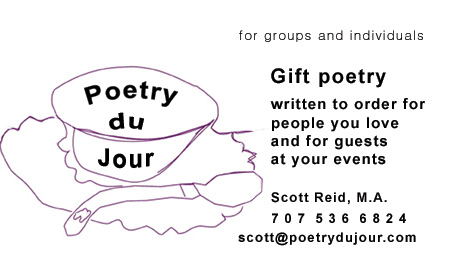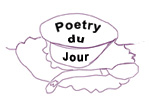Poetry du Jour Blog
Sonoma County Wildfires:
Writing for Relief
27 October 2017
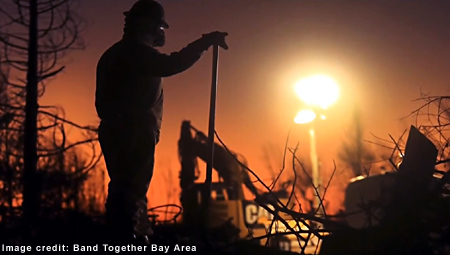
First responders arrive to protect infrastructure. Who attends to matters of the heart?
The Poet as First Responder
It's a few days before Halloween at Occidental Farmer's Market, and folks are floating up and down the center aisle in costume: one vendor is wearing a tall black sorcerer's cap with moons and stars, black fingernails; the market manager, beams of sunlight radiating from her forehead, is dressed as the Statue of Liberty.
A mother with two tween girls comes up to my poetry table. Mom is wearing a bat headband with purple hair, "You look like the kind who would suck a lollipop at an all-night rave," she says.
I'm wearing my wide-brimmed straw hat from Mazatlan, with a hand-painted pumpkin attached to the headband. I had been feeling a little anxious that I would look out-of-sorts. But today, I'm in good company.
One of her girls is wearing sheep horns jutting from the sides of her head, buggy golf ball-size eyes poised over her brows, and a racy polka-dot Avenue Q-ish ensemble. Her friend is dressed in a long, flowing black wig, leggings with galaxies, and a length of copper wire entwining her waist and torso. "You're the universe?" I guess. "She's a cosmic gal," says Mom. "I'm writing poems for people about their experiences with the wildfires today," I tell them. She orders a poem, saying "We'll be back."
Mother Sarah takes off with her girls for a snack. "Galaxies get hungry too, you know," the man across from me at Gerard's Paella says, emptying a gallon of olive oil into one of two four-foot diameter steel cooking pans poised above propane gas jets.
The mood at the market this afternoon is a playful, but uneasy mix of Halloween frivolity, silliness, relief, anxiety, depression and fear. People need to get out and visit with their neighbors, relax and enjoy the falling October sun, the bright air. Three weeks have passed since the outbreak of the Northern California wildfires. By now, the flames have been extinguished for about a week; the air in West Sonoma County has finally begun to clear.
What can I do to help? I'm just a guy with a typewriter who sits at open-air cafes and markets, dialing phony numbers on a rotary telephone, talking to imaginary guests, and typing poems for people to give to their friends. I want to do something to help fire victims and their families. What can I do? Images of families sifting through the cinders looking for their belongings fill the pages of the local papers.
I am thinking about Walt Whitman, deeply affected by the suffering he saw, volunteering as Civil War nurse, to comfort the sick and wounded.
Can poetry matter? I hope that it does. I tell people who come by the table that I am writing about the wildfire, and ask whether they would like to have a poem written about their experiences.
A woman wearing a large porous foam headdress with hollow yellow cheese-like slices draped from her shoulders walks past. I want to believe that poetry can help us heal. I'm here to find out whether it can. And how. And why.
There are several approaches I might take when writing a gift poem about the fire:
• Survival: poetry of survival shows how the speaker has endured a traumatic event
• Witness: poetry of witness gives the details of an event, emotions, or of another person
• Love: poetry written for someone to give as a gift to a loved one can show thankfulness
• Praise: poetry of praise extolls the quality of a person or thing
• Forgiveness: poetry of forgiveness can either ask for, or show forgiveness
• Gratitude: poetry of gratitude gives thanks for another person or for an event
• Hope: poetry of hope can express feelings for recovery, renewal, regeneration
Galaxy and Buggy Eyes come back to the table. We decide on a poem of gratitude for their friend. I learn that Zoe (Galaxy) and Julia (Buggy Eyes) are both middle-school students from Healdsburg. They want to commission a poem for their friend, Kellen.
I start by asking them the usual questions: "What does he like?" (soccer), "What is he good at?" (hurting himself), "What does he love most?" (supervillains and superheroes), and the "sweep of cruel fingers of the night."
I ask Galaxy to mention a few things about Kellen that she finds annoying. She says that he distracts and interrupts her when she's trying to tell him a story about her dog, Brookline, who chases her around the couch and then jumps on her. "Slides under my leg." she says, "Treacherous."
But there's a teaching opportunity here.
We talk a little about irony, "It's when you say the opposite of what you mean." Her eyes
begin compressing into a pair of dwarf stars.
She likes the idea of complimenting Kellen for interrupting her.
We settle on these lines:
"The way you talk and talk,
distracting me ...
... how adorable of you
to interrupt."
We come to the final part of the poem, where the speaker gives a straightforward blessing to the recipient. I dial Kellen on the rotary and place the handset on the table, telling them, "We're on speaker phone." I ask them to take turns giving Kellen their blessings and thanks for his surviving the wildfire. Here are the closing stanzas.
I love how you know
it is not my best day,
how you always come
to comfort me
when I am sad and
sit beside me at lunch.
I love you because
you are always funny,
and when I am upset
you make me laugh
when we are in the grove.
Parents with toddlers dressed as Dracula, T-Rex, and Werewolves stroll past; their little ones just a few wobbly steps ahead. As I'm finishing up typing "Our Smoky Friend" for Galaxy and Buggy-Eyes, a group of three women about my age, come by. The typewriter clacks like skeleton bones.
Two of the women are from Sonoma County; their friend is visiting from Napa. They're on their way to dinner. When I offer to write them a poem about their impressions of the recent fires, one woman steps forward, cell phone in hand. She scrolls to images of her home and then swings the screen around. Devastating.
Little remains of the walls; the tombstone of a chimney. Tree vertebrae, a femur, knee caps. Her friends are patient and wait nearby while I talk with Sandy. She wants to give a blessing for her home, which she calls "Stone House." She says that her home was a healing place. "It was a sanitarium," she says. I hope that this writing experience and the poem can help her.
Stone House
Martha Walker
owned you once,
horticulturalist;
Ansel Adams,
with his art community
from SF, took
his first Polaroids
when he visited you,
pronouncing
a familiar light on
Monticello Road,
Napa.
Apple trees,
plums and pears:
their sweet fragrances
linger now beside you,
biodynamic farm with
long-haired
Scottish Highland cows.
The sweet longing
of language
in the energy of your chard,
ubuntu lettuce mix,
varietals, the chickens—
how you loved the chickens,
taking from and giving
to their bodies.
Beautiful you were
to me;
I’m going to miss you.
I hope the rest
of your life is beautiful.
You brought me longevity,
healing place,
gone now,
you are still
of today.
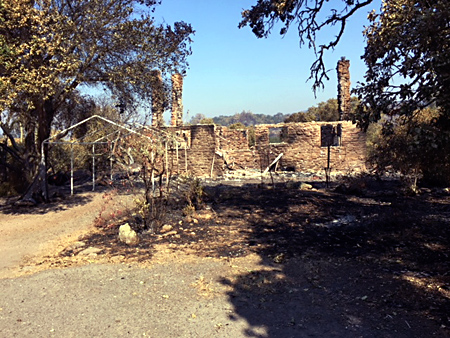
Sandy's "Stone House," on Hwy 121, east of Napa, heading toward Lake Berryessa
Someone wearing an Elephant Man costume passes by. I wonder if there might be something I can do to help him with his condition.
About a week after sending the poem to Sandy, I receive her reply:
Thank you Scott,
My friends and I enjoyed meeting to you and talking. The poem is lovely and a fitting tribute to the stone house. Thank you so much for using your talents to heal and change the world.
Warmest regards,
This afternoon, I mail a check for 100% of the proceeds from today's donations to the Redwood Credit Union's North Bay Fire Relief Fund. As of this writing, RCU has received over 21M in donations.
November 12, 2017
Mushrooms in Rain
A month has passed now since the wildfires. Crews are working to remove melted garage doors, broken pipe, cinders and dust. Our Sonoma air is sweet again, but folks are still on edge, recovering from their shock and loss.
During the peak of the battle to bring the fires under control last month, our neighbors had posted thank-you signs on poles, fences and trees up and down local highways. They're quickly-fashioned signs, posted to thank the first responders, some from as far away as Santa Barbara County.
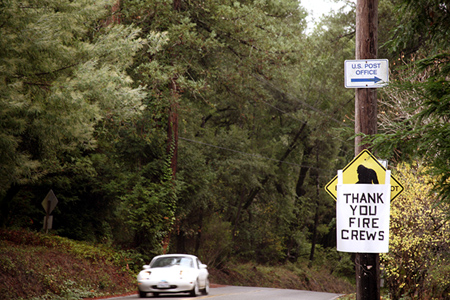
Hundreds of roadside signs showing gratitude appear across Sonoma County.
We've had our first rain now. Some of the signs still remain, wilted and drooping in the drizzle, reminding us of the bravery, hard work, and dedication. They sprout along the roadways like mushrooms in rain.
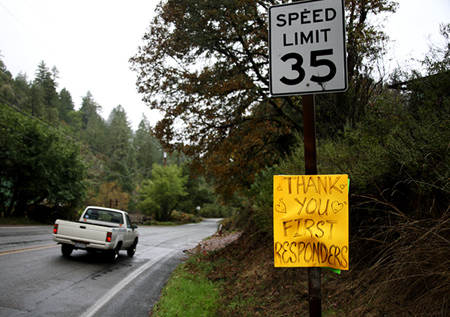
Today I am headed over to the Sebastopol Center for the Arts. There is a special gathering of writers and poets who were affected by the wildfires. The event is organized and presented by Iris Jamahl Dunkle, Terry Ehret, Katherine Hastings, Larry Robinson, 100 Thousand Poets for Change, and the Poet Laureate Selection Committee of Sonoma County.
Reading slots are assigned to 20 local writers, from children to seniors, who were directly affected by the fires, who lost someone, their property, or who were evacuated for days. I will call them our embersaries.
They bring us words and images of soot, melted garage door frames, cinders, broken glass. They bring us words of hope, of witness, survival, gratitude for first responders, and love for those who survived. Words of kindness and blessing for those who remain and for those who will rebuild. Today's poetry reading is titled Rising from the Ashes—the Heart of Poetry, Honoring the pain and celebrating the resilience.
Fear and trauma hang in the words like the soot that recently speckled our air. One reader gives hope for regeneration. Many poems focus on the imagery of sheer destruction, animating and personifying the fire as "walls of flames," as "shark's teeth of embers." Other poems focus on the healing process, on hope, on looking forward, giving us courage, wisdom, offering us lessons.
About 150 people sit and listen. On the back table, copies of poems written by those who were unable to attend are stacked beside calls for manuscript submissions; the words from an anonymous Celtic poem "I am the weaver of tales" appear on the back of this afternoon's programme.
At the end of the reading, Terry Ehret invites us to visit and share stories with our neighbors. I want to talk with few former Sonoma County Poets Laureate. Approaching Gwynn O'Gara, I ask her, "Can poetry heal?" Gwynn's eyes brighten; the two tiny brushstrokes of her eyebrows flutter upward. "Of course it can," she says.
I want to talk with Jackie Hallerberg, one of today's readers. She currently serves as the President of the Board of Directors for California Poets in the Schools (CalPoets).
Jackie lost her home in the Wikiup area of Santa Rosa. The haibun poem that she just read tells us that "the fire divides lives into what was before and what comes after." Moments after being ordered to evacuate, she recalls for us the choices between those things that she could pack, and the things that she had to leave behind. She left behind her father's WW II medals.
"I've been thinking about the notion of the poet as first responder," I say to her, "What do you think?" Jackie turns the idea over, speculating; a wild halo of white hair swirls around her.
"Well, there are first responders," she says. "The firefighters, ambulance drivers, law enforcement. Can poets be considered as first responders? There are the second responders. The third responders," she tells me. "Maybe poets are the first responders of the heart."
I am available via Skype for consultation. Please email me to order your gift poem today.
